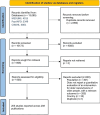What works to support carers of older people and older carers? an international evidence map of interventions and outcomes
- PMID: 38553679
- PMCID: PMC10979610
- DOI: 10.1186/s12877-024-04897-3
What works to support carers of older people and older carers? an international evidence map of interventions and outcomes
Abstract
Background: Unpaid carers of older people, and older unpaid carers, experience a range of adverse outcomes. Supporting carers should therefore be a public health priority. Our understanding of what works to support carers could be enhanced if future evaluations prioritise under-researched interventions and outcomes. To support this, we aimed to: map evidence about interventions to support carers, and the outcomes evaluated; and identify key gaps in current evidence.
Methods: Evidence gap map review methods were used. Searches were carried out in three bibliographic databases for quantitative evaluations of carer interventions published in OECD high-income countries between 2013 and 2023. Interventions were eligible if they supported older carers (50 + years) of any aged recipient, or any aged carers of older people (50 + years).
Findings: 205 studies reported across 208 publications were included in the evidence map. The majority evaluated the impact of therapeutic and educational interventions on carer burden and carers' mental health. Some studies reported evidence about physical exercise interventions and befriending and peer support for carers, but these considered a limited range of outcomes. Few studies evaluated interventions that focused on delivering financial information and advice, pain management, and physical skills training for carers. Evaluations rarely considered the impact of interventions on carers' physical health, quality of life, and social and financial wellbeing. Very few studies considered whether interventions delivered equitable outcomes.
Conclusion: Evidence on what works best to support carers is extensive but limited in scope. A disproportionate focus on mental health and burden outcomes neglects other important areas where carers may need support. Given the impact of caring on carers' physical health, financial and social wellbeing, future research could evaluate interventions that aim to support these outcomes. Appraisal of whether interventions deliver equitable outcomes across diverse carer populations is critical.
Keywords: Carers; Evidence gap maps; Interventions; Older people; Outcomes.
© 2024. The Author(s).
Conflict of interest statement
The authors declare no competing interests.
Similar articles
-
What are the consequences of caring for older people and what interventions are effective for supporting unpaid carers? A rapid review of systematic reviews.BMJ Open. 2021 Sep 29;11(9):e046187. doi: 10.1136/bmjopen-2020-046187. BMJ Open. 2021. PMID: 34588234 Free PMC article. Review.
-
Impact of interventions to improve recovery of older adults following planned hospital admission on quality-of-life following discharge: linked-evidence synthesis.Health Soc Care Deliv Res. 2023 Nov;11(23):1-164. doi: 10.3310/GHTY5117. Health Soc Care Deliv Res. 2023. PMID: 38140881
-
Improving support and planning ahead for older people with learning disabilities and family carers: a mixed-methods study.Health Soc Care Deliv Res. 2024 Jun;12(16):1-161. doi: 10.3310/MTHW2644. Health Soc Care Deliv Res. 2024. PMID: 38940476
-
Beyond the black stump: rapid reviews of health research issues affecting regional, rural and remote Australia.Med J Aust. 2020 Dec;213 Suppl 11:S3-S32.e1. doi: 10.5694/mja2.50881. Med J Aust. 2020. PMID: 33314144
-
The impact of befriending and peer support on family carers of people living with dementia: A mixed methods study.Arch Gerontol Geriatr. 2018 May-Jun;76:188-195. doi: 10.1016/j.archger.2018.03.005. Epub 2018 Mar 7. Arch Gerontol Geriatr. 2018. PMID: 29547740
Cited by
-
A study protocol for a pragmatic pre-post trial to determine the feasibility and effectiveness of a novel co-designed service to support health and wellbeing of older carers of older people.PLoS One. 2025 Jun 18;20(6):e0326363. doi: 10.1371/journal.pone.0326363. eCollection 2025. PLoS One. 2025. PMID: 40531926 Free PMC article.
References
-
- van Oostrom SH, Gijsen R, Stirbu I, Korevaar JC, Schellevis FG, Picavet HSJ, Hoeymans N. Time trends in Prevalence of Chronic diseases and Multimorbidity not only due to aging: data from General Practices and Health Surveys. PLoS ONE. 2016;11(8):e0160264. doi: 10.1371/journal.pone.0160264. - DOI - PMC - PubMed
-
- Kingston A, Comas-Herrera A, Jagger C. Forecasting the care needs of the older population in England over the next 20 years: estimates from the Population Ageing and Care Simulation (PACSim) modelling study. Lancet Public Health. 2018;3(9):e447–55. doi: 10.1016/S2468-2667(18)30118-X. - DOI - PMC - PubMed
-
- Projected growth in demand for. long-term care services represents a major challenge for ageing Europe [https://knowledge4policy.ec.europa.eu/news/projected-growth-demand-long-...]
Publication types
MeSH terms
Grants and funding
LinkOut - more resources
Full Text Sources
Medical
Miscellaneous


